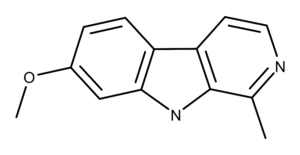Harmine is a tricyclic alkaloid compound in the ß-carboline family.1 It was originally isolated in 1847 from the seeds of the wild rue, Peganum harmala, but it is found throughout nature in mammals, insects, and marine organisms. Harmine was recently isolated from several species of psychedelic mushrooms.2
Harmine is one of the main active compounds in ayahuasca. Compounds like harmine in the ß-carboline family of chemicals are inhibitors of monoamine oxidase (MAO) enzymes.1 In particular, harmine inhibits MAO-A, an enzyme that allows DMT (dimethyltryptamine, another component of ayahuasca) to pass into the digestive system and eventually the brain.
In addition to its hallucinogenic effects, scientific studies on harmine indicate it has several beneficial properties. Its effects include having antimicrobial, antifungal, antioxidative, antitumor, and cytotoxic properties (reviewed in Patel et al. 2012). One study has shown harmine to have anti-depressive effects which may be mediated by its interaction with MAO-A and the serotonin 5-HT2A receptor.3
Like other chemicals in the BCA family, harmine is highly neurotoxic.4 High levels in the blood are associated with essential tremor and Parkinson’s disease.5
